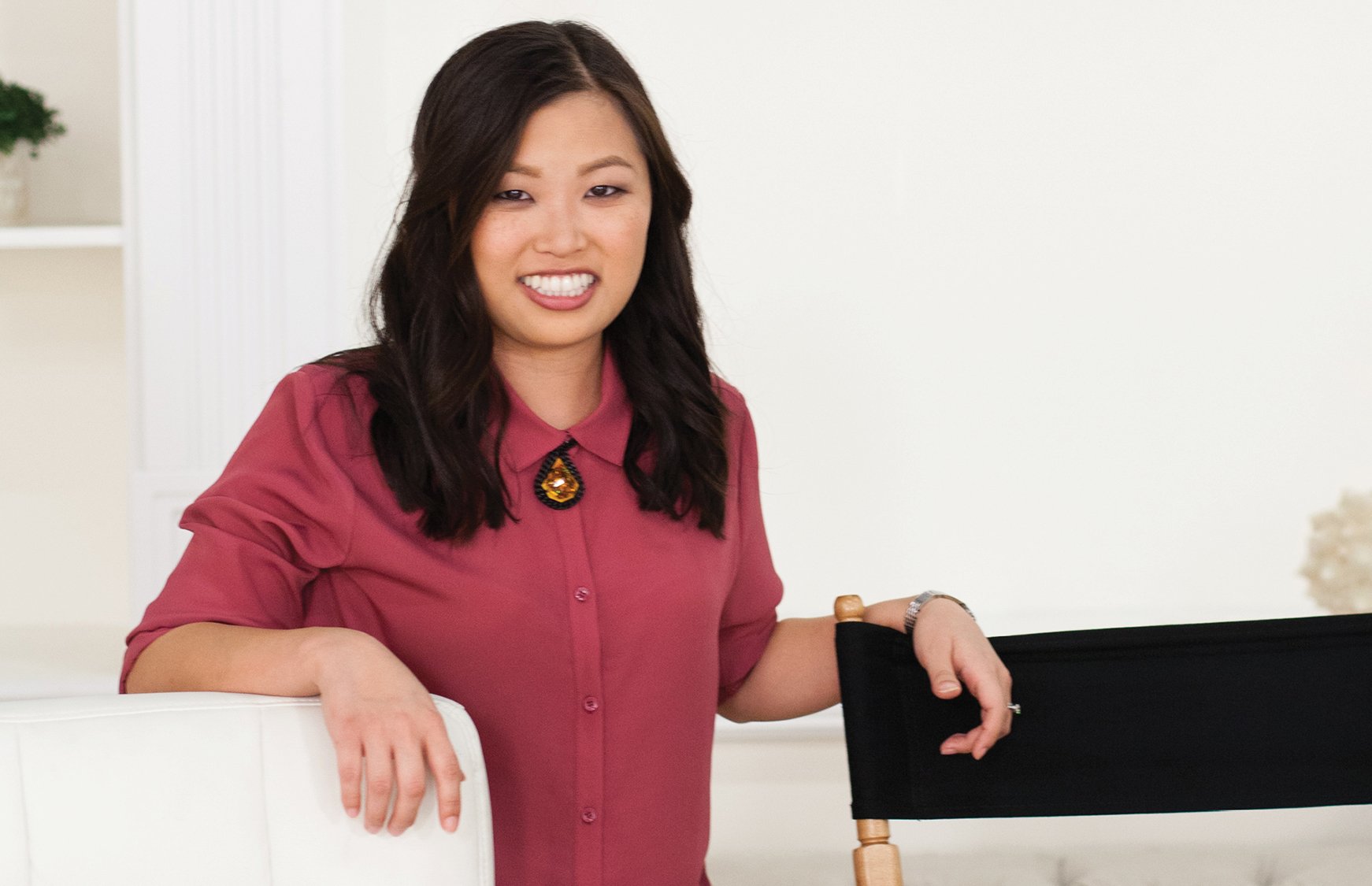Students may have an idea what industry they want to work in post-grad, but having the drive and persistence to break into an industry as competitive as Hollywood takes some serious work. For Donna Lee, 31, the allure of the television industry was far too great to deter her from her goal of one day being a studio executive. Once a Production Assistant for “The Larry Elder Show,” she now works as a Senior Producer for the fast growing online media website POPSUGAR.
How did she get her start? Well, Donna managed to get her foot in the door at POPSUGAR through good old-fashioned broad spectrum networking. And now, as a Senior Producer, Donna has her hand in every step of the video-making process. From brainstorming creative concepts for the video, to tracking deadlines and budgets on the business side—the phrase ‘boring day’ is not in her vocabulary.
Her other valuable perspective? The idea that one dream can evolve successfully into another. Donna actually took a brief break from the entertainment industry, enrolling in culinary school and later worked on Top Chef for several seasons. As she puts it “everyone goes through a quarter-life crisis at some point, but it’s all about embracing it.” Donna’s story teaches us that life is about accepting the unexpected and how, if you’re passionate about what you do and where you work, success will eventually follow.
Her Starting Point
Many people find the transition between college and “real life” a bit daunting. Can you tell us about your journey between the two? What was your first job post-college?
My first job out of college was working as a Production Assistant (PA) for “The Larry Elder Show,” a start-up daytime talk show produced by Telepictures (Ellen, Extra, TMZ). It was the quintessential entry-level production position where I worked a minimum of 12 to 14 hour days doing everything from running out to get Starbucks for the Executive Producers (EPs) to being on set with a walkie-talkie making sure the guests were ready.
Post-grad, I knew I wanted to “work in the entertainment industry,” but I didn’t quite know in what capacity. Towards the end of college, I realized I much preferred TV to film because of the faster pace, but that was the extent of the direction I knew I wanted to go in. My first gigs in the industry happen to be in non-scripted/alternative programming, and I loved how fast, relative to scripted, we could shoot something and then it was on the air. I also didn’t want to work in scripted television and ruin the smoke-and-mirrors, so I stuck to “real people” entertainment, which I also found more interesting.
How did you come to work at POPSUGAR? What do you love most about the company? Is it ever strange to work for a company’s satellite office vs. their headquarters?
I was freelancing in reality and talk television for several years on shows like Top Chef (did three seasons), Ask Oprah’s All Stars, The Bonnie Hunt Show, The Tyra Banks Show and countless pilots, but I was ready to find a home at a company I could grow with. I also was very interested in the digital space because I am still confident that online is eventually going to be the medium for all content, so I wanted to get in while still on the forefront. I utilized a few connections I had with people at POPSUGAR and got my foot in the door.
I’ve been working at POPSUGAR for almost two years now and, as much fun as the freelance days were, I enjoy having the camaraderie of a work family I can count on every day instead of having to start over on a new show every 6 to 12 weeks. When I started, we were only about a dozen people in the LA office and, in just these last two years, our company has grown and expanded exponentially in Los Angeles, San Francisco, New York, Chicago and London. All of the cities work very closely together on a daily basis, and we utilize video conferencing and Google hangout so it feels like there is no distance between us. I love how innovative we are as a company and the positive work environment that empowers women.
How did you learn the ins and outs of television and digital production? What skills are essential to your job?
I think I learned more in four months of physically working in television than the four years of studying it in college. Producing is very much a learn-by-doing kind of job. Every show functions a little differently, but you learn to adapt and figure it out, which is pretty much what a producer’s core job is—find a way to make it happen.
Producing requires instinctive problem-solving skills and creativity that can’t really be taught, but experience can help you figure out what to do and how to handle any situation. It’s essential to be able to anticipate five steps ahead, always be resourceful and be ready to calmly handle Murphy’s Law since it will always happen. I was lucky and had really great mentors who guided me through situation where I just had to make it happen, no matter what, under any circumstances. It is sink or swim, and (thankfully) I swam. Not everyone does.
Her Big Break
Tell us about the daily tasks and responsibilities of a Senior Producer.
As a Senior Producer at POPSUGAR, I am responsible for overseeing a video project from start to finish. From development of the creative to hiring the crew during pre-production, being on set with the director and giving notes to the editor during post-production, I manage every aspect of the video process.
On a daily basis, I am handling several different projects in various stages and making sure deadlines are being met, we are on budget, we are developing new ideas and that everyone involved is delivering on schedule. I am constantly on email, conference calls and in meetings with various parties depending on what part of the project we are discussing. It’s a lot of project management and creative problem solving, in addition to coming up with creative ideas, being on set for shoots and watching review cuts and giving notes.
The word 'producer' seems hard to define. How would you best describe the general responsibilities associated with that job title?
Producer is an all-encompassing title that ultimately boils down to one major responsibility: Deliver a finished product. The job responsibilities include everything from overseeing production, signing off on all decisions, putting out any fires, hiring or approving the hire of everyone involved in production and ultimately making sure that at the end of it all, the content handed over is the best possible version. The specifics are handled differently across the various platforms, but in the end the producer is responsible for ensuring a project makes it through production and satisfies the requirements of whomever commissioned and/or will distribute it. Producing means delivering.
On a day-to-day level, producing involves a lot of meetings, emails, calls, budgeting, reading, writing and mainly answering a lot of questions. As the person in charge, a producer is accountable for any and all decisions made, so it results in being asked a lot of questions. There is no training manual for how to do it and every producer has their own way, but once you learn how to put the pieces together, a good producer can produce just about anything.
On a more specific level in the non-scripted world, there are several different types of producers who are in charge of particular elements. For example, a story producer is responsible for taking notes during a shoot and then piecing together the story in post production. A field producer is responsible for handling production on location and are more hands-on with the talent. A line producer deals with budgets and logistics. A segment producer is responsible for putting together their particular segment that goes into a bigger show. A casting producer or talent producer is responsible for booking or sourcing the right talent for the project.
As a Producer, how involved in the writing and researching of a project do you get? Are you more involved in the initial development?
A producer is the project manager of a video from the inception of the idea to delivery of the final video, and everything in between. It’s my job to make sure nothing slips through the cracks and that everything goes according to the plan that I came up with.
I am heavily involved in the creative development process. We typically start by having some sort of basis for the video (“we have to make a video involving X”) and then we brainstorm creative ideas and ways to execute. It is a very collaborative process during pre-production between producers, directors and subject-matter experts to put together the creative beats and shoot plan. We also have to make sure we can execute the creative within the budget, so sometimes we get creative about how to shoot something or cut things altogether.
From there, the director is more in charge of the shoot itself, but I am on set to make sure everything is running smoothly and I handle any issues that come up, which they always do. Once the video goes through editing, I watch the cuts and give feedback and notes to the editor. When I am satisfied with the video, the editor delivers the final version and then we post it to the site.
When pitching a new segment, what are the most important elements you look for?
When pitching new segments I ask myself several key questions. Would I want to watch this? How relevant is this in current pop culture? Have I seen this before? If so, how can we make ours different? What’s the “hook?” In other words, what’s that piece that will give people a reason to watch this? And finally, a one-line elevator pitch (tell me the idea in 30 seconds).
You work with an online video network. How does this differ from working in cable television or films?
Online video works exponentially faster than traditional cable television or film. Film takes years to go from development to release. Cable television typically takes a few months, between shooting and airing. Our content goes from shooting to posting anywhere from a couple of days to a couple of weeks, depending on the video.
Since we produce videos in higher volume on smaller budgets, we have streamlined processes that allow each of us to be much more hands on, and that let us learn more about how to do everything in production, which gives us an advantage over people who only know how to do the one thing they do on a film or show. If we come up with a cool idea, we can put it together and post it for the world to see in a matter of days. We also have the ability to bypass a lot of the red tape that other media face since we are essentially our own studio, production company and network in one.
How much of your role involves working closely with cross-functional teams like writers, editors, anchors, etc.? How much of your role includes creative skills and how much includes business skills (ie. budget, managerial, analytical)?
In my role of overseeing production from start to finish, I inherently work very closely with every person who touches the production of the video, including the on-camera talent, the director, on-set crew, the video editors and everyone in between. My role is all encompassing, so part of my brain is spent on developing creative and creative problem solving, and the other part on the business aspects, like pricing estimates, tracking budgets and making sure we hit deadlines. It is probably a 30% to 70% split of creative and business.
Her Perspective
What is your favorite part of your job? What is the most challenging?
My favorite part of my job is that no two days are the same. Every video is different and we have the ability to try new things with every video we create. It’s impossible to get bored when every day requires me to utilize both sides of my brain for a million different things.
The most challenging part of my job is that the volume and scope of projects is ever changing, so it can be difficult sometimes to find a consistent work/life balance. I am also kind of a workaholic, so there are times when I have to remember that the work will still be there tomorrow.
If we had the chance to peek at your schedule, what would an average day look like?
If it’s a non-shoot day, this is what an average day looks like:
-
8:00 a.m.: Respond to emails from the east coast
-
9:00/9:30 a.m.: Get to the office
-
10:00 a.m.: First of many conference calls
-
11:00 a.m.: Meeting with team
-
12:00 p.m.: Another conference call
-
1:00 p.m.: Eat lunch at my desk while replying to emails
-
2:00 p.m.: Kickoff call for new project
-
3:00 p.m.: Pre-production call for shoot tomorrow
-
4:00 p.m.: Meeting for budget and production needs
-
5:00 p.m.: Creative brainstorm
-
6:00 p.m.: Watch reviews cuts and give notes, finish up outstanding work
-
7:00/7:30 p.m.: Go home
If it’s a shoot day, it’s pretty much: Go to set around dawn, run around and make sure it’s going smoothly and leave at dusk.
What type of training would you recommend to aspiring producers? Is Hollywood a closed or open door? Is it all about who you know?
I would recommend finding a way to get your foot in the door in the area that you want to work in. The different worlds within the entertainment industry don’t translate to each other. For example, if someone starts out in non-scripted digital content, they will have a tough time transitioning into scripted film or television because you get pigeonholed in whatever you start in. You will always have to start at the bottom and work your way up, so you should work your way up in the field you want to be in.
If you’re not sure what area you like, it’s pretty easy to get hired as a PA and then you can get on-set experience for different types of projects until you figure out what area to pursue. I would not recommend starting out as a desk assistant (unless you know you want to work in that world, like an agency or talent management) because you won’t get the same hands-on experience as being on set if you are sitting in an office answering phones.
Hollywood is open to those who know which doors to knock on and are too stubborn to quit. It is all about who you know, but everyone knows someone, so you can usually find a way in. It’s what you do when you get in the door that dictates whether you make it or not. It is an incredibly competitive industry and truly only the strong survive. Most of my friends who started in entertainment have since quit and moved on to different career paths. It’s definitely not an easy industry, so you have to know in your heart that this is the only thing you want to do in life, and hold on to that passion even when you’re being told “no” all the time. It’s not as glamorous as it seems—it’s stressful, long hours, hard work and a lot of rejection—but, if you’ve got the drive and dedication to keep doing it, it can be a lot of fun.
What’s next for you? How would you like to see your career evolve?
I plan to work at POPSUGAR for a while and continue to grow with the company. I feel like we are only at the tip of the iceberg of what this company is becoming, so I am excited to be an early contributor of the movement and keep going along for the ride. My goal has always been to become a studio executive, and I will continue to work my way up the ranks to accomplish that goal.
And finally, what do you wake up looking forward to?
Solving the next problem. My brain naturally works in problem-solving mode, so I feel fulfilled when I am able to solve something. Since every day brings new challenges, I look forward to strategically conquering the day’s puzzle pieces and then going home at night not thinking about work because it was all completed at the office.
You May Also Like
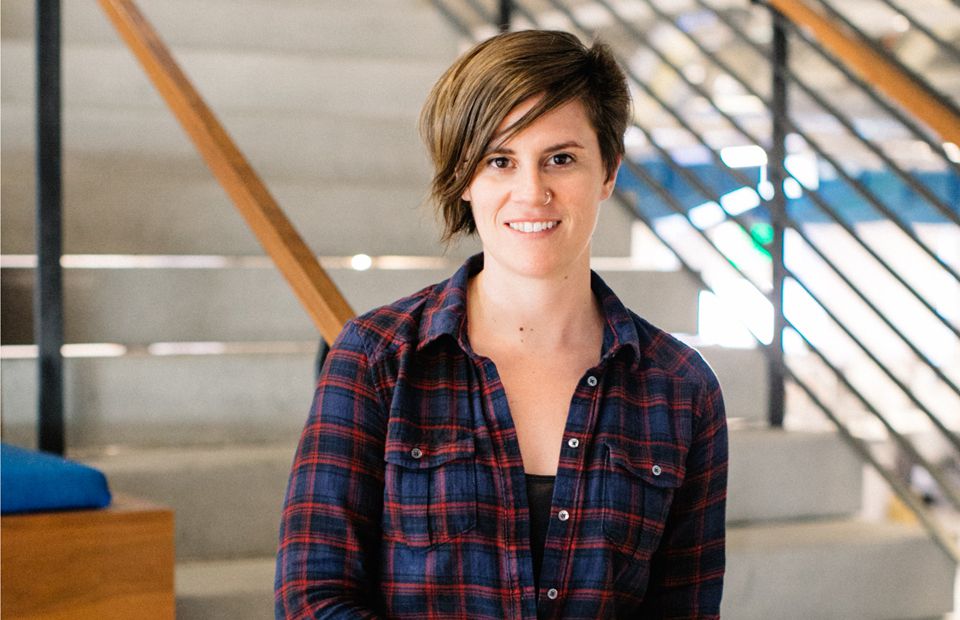
Media
How to Use Positive Reinforcement at Work—and Other Advice from a Pandora PM
"My advice to anyone who wants to get into product management is: check your ego at the door."
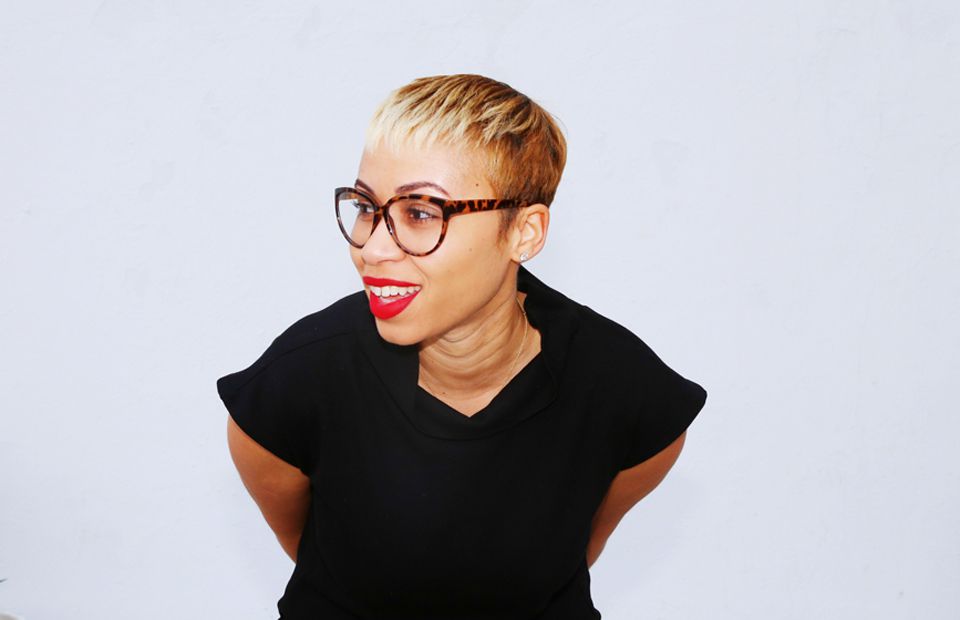
Media, Communications + Public Relations
How to Take Risks, Make a Switch, and Find a Career You Love—From a Woman Who's Done It 4 Times
Making your wildest dreams come true starts with understanding yourself—and Ahyiana Angel can help.
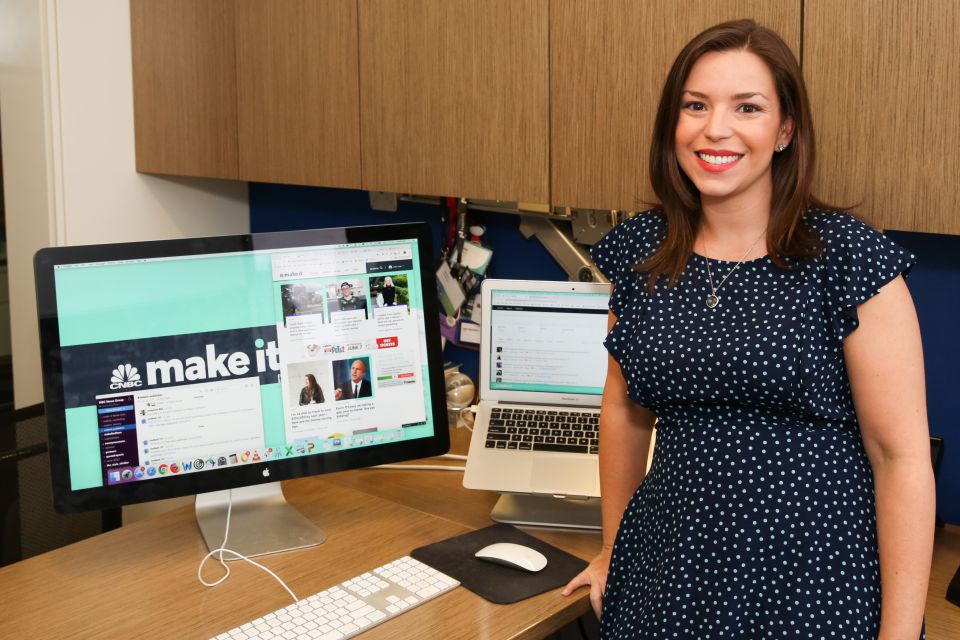
Communications + Public Relations
Creating Content That Empowers Audiences with CNBC's Digital VP and Managing Editor
This week, we interviewed Jenna Goudreau, the VP and managing editor of CNBC Digital. Let's learn how she keeps her powerhouse content creation machine going.
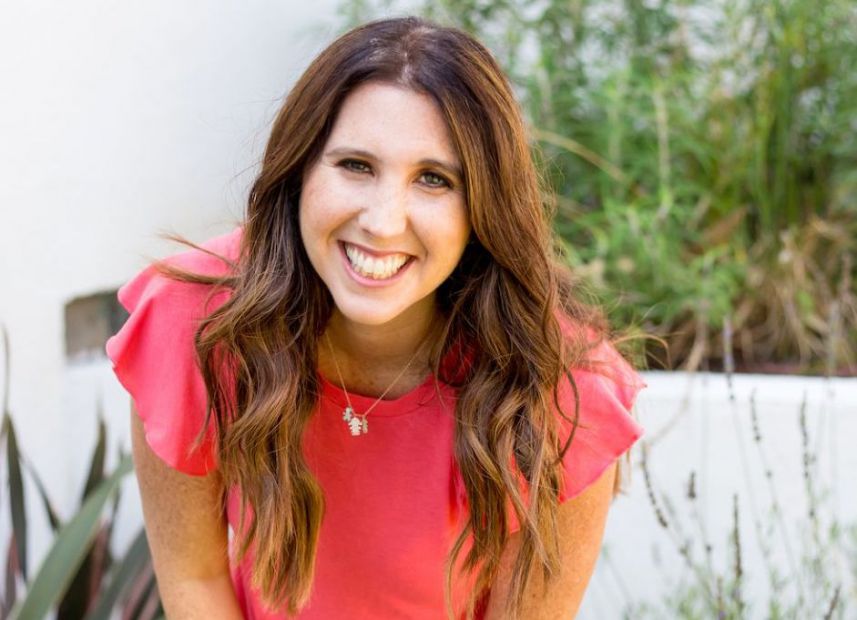
Entertainment
Working Creatively From Home with Cathy Heller
Cathy Heller is a singer, songwriter, entrepreneur, mother—and now, an author. Determined to lift others up to the "happiest versions of themselves," this queen of the hyphenated job title, leads by example. She shared how to build a fulfilling career in a creative field—all while working from home.
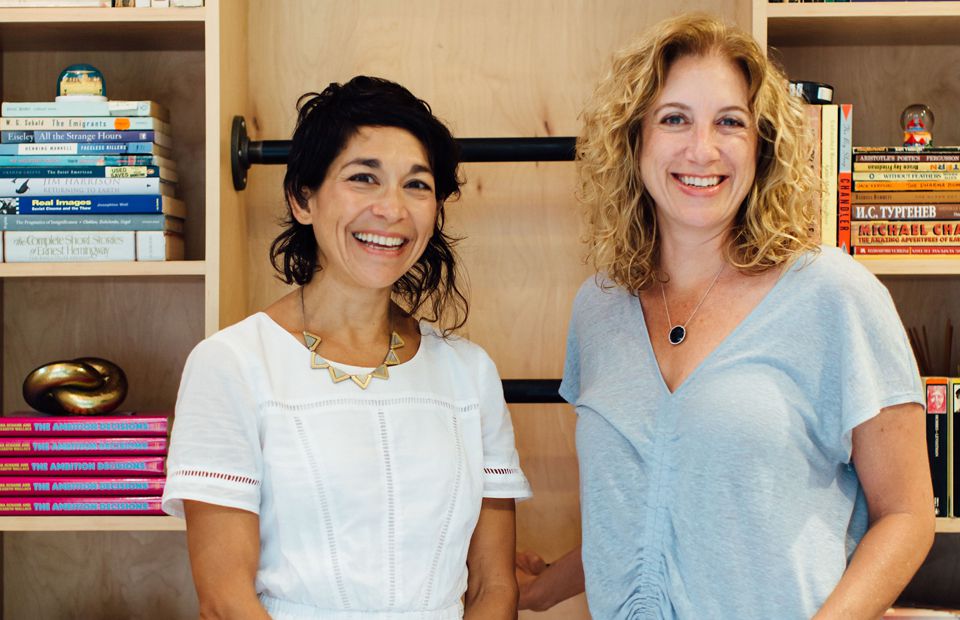
Media
Women, Work, and What It's Like to Write With Your Best Friend—From the Authors of The Ambition Decisions
"We should all give ourselves permission to challenge the things we think can’t be challenged."
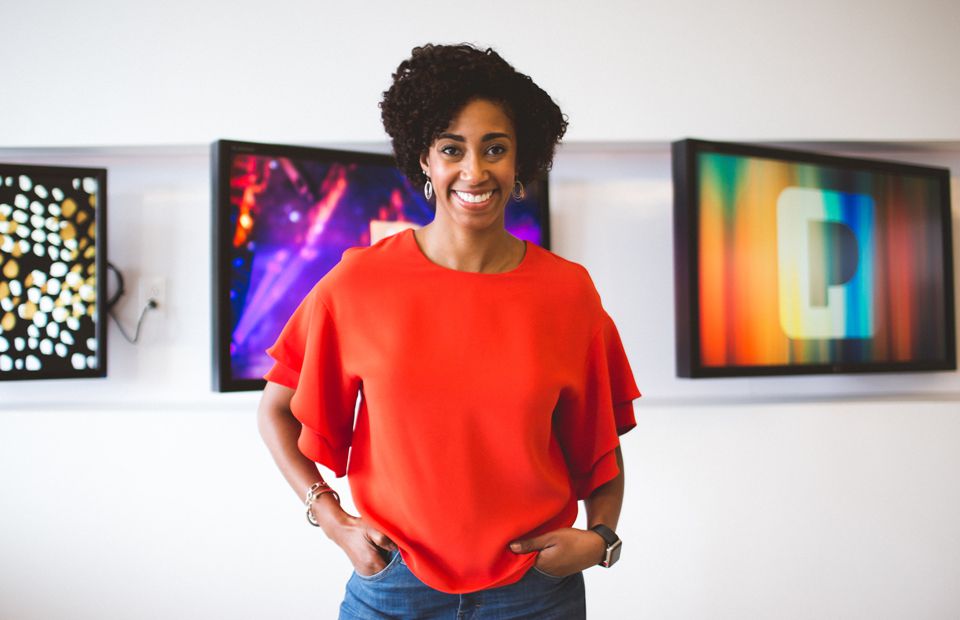
Media
A Director at Pandora on Staying Present, Celebrating Others, and Learning From Failure
"Share your wins, but most importantly, share what your growth areas are, share when you fail, share how you bounced back."
Get the Best Career Advice Delivered To Your Inbox
Join our newsletter to stay in the loop.
